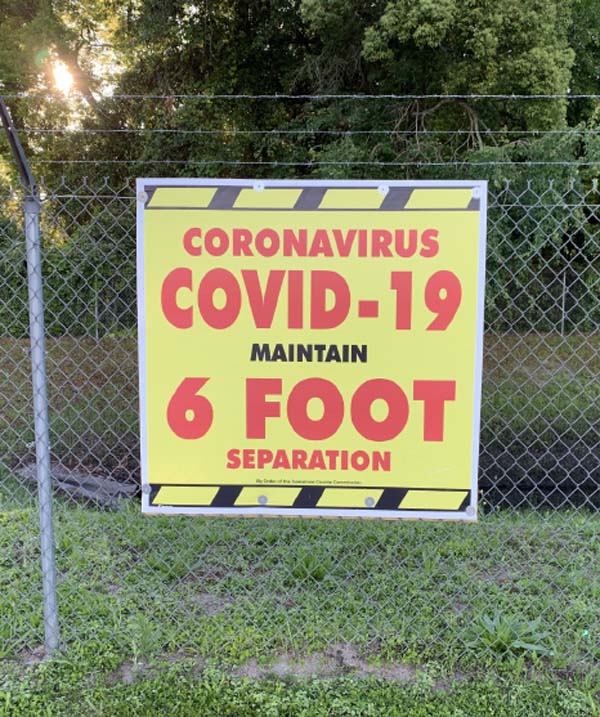4-29-20
Effects of the COVID-19 Pandemic

-Photo by Jeffry Boatright
By Jeffry Boatright
It is perplexing to consider what a difference sixty days can make. Just eight weeks ago, we welcomed springtime with plans of Easter, spring games, and leisurely activities that embody our area. Mission trips, high school proms and spring break vacations were being planned. The economy was growing, business seemed good and preparation for standardized testing in schools was a key concern for parents, students and educators.
A few of us did watch as things commenced to unfold with COVID-19. After seeing what had transpired abroad, our concerns grew on March 01, when Florida Governor Ron DeSantis confirmed the state’s first two known cases of the virus. From that point forward, we began feeling like characters in a bad science fiction movie.
To begin with, most of us felt personally unaffected by the COVID-19 pandemic. Sure, we had compassion for the victims, who we assumed were all hundreds of miles away. We lifted them and their families up in prayer and yearned for the spread to stop. We prayed that a cure might be found, but we still went about our normal activities.
In less than two weeks, everything changed. We were directly affected by the pandemic when Governor DeSantis suspended all school activities for two weeks. Still, most of us had no idea of the havoc that COVID-19 was about to play in our lives. With increasing cases throughout the state, DeSantis ordered the closure of bars and night clubs the following week and announced that school activities would not return to campus before mid-April.
We know how the next month played out. Many of us do not leave home without our masks and disposable gloves, we no longer shake hands and refrain from large gatherings. Movie theaters are empty, no kid is at bat and dining areas remain closed in restaurants. Church pews are empty, unemployment is dangerously high and uncertainty remains.
The worst part is that COVID-19 has claimed over 207,000 lives globally, with over one-fourth of the deaths in the United States. As of Monday, over one thousand Floridians had succumbed to COVID-19, with over 32,000 known cases confirmed in the state. Locally, there have been 118 confirmed cases in Suwannee County alone, with eleven deaths.
Even with the presence of the virus, people have grown weary of social distancing. After all, we are a socially driven society. Most people just want things to return to the way they were as economic concerns intensify, and they will. Kids will be back at bat, movie goers will return to the theaters at some point and we’ll enjoy dining in our favorite restaurants before long. We might even pack the church pews again. But, do we really want things to be exactly as they were? Have we learned things from this horrible pandemic that might even create a better tomorrow?
Many of us have learned that we are better suited for grocery deliveries. Sure, it costs, but is it really more expensive? Personal experience proves that grocery shopping often yields those extra packs of cookies and unnecessary treats that we consciously omit when Instacart shopping.
We have learned to use technology in ways that we never imagined. Whoever coined the phrase, the church is not closed, it is on deployment, deserves credit. Churches have learned to suffice and developed outreach ministries they might not have envisioned a few weeks ago. It would be a shame to abandon these tools that afford churches the opportunity to reach those who otherwise might be unable to attend worship services and study courses.
Grandparents have become proficient with Facetime while Zoom birthday parties have brought faraway relatives home for the party. We have recognized the importance of having a supply of food in the pantry and making each trip to the store count. Perhaps we have all learned to improvise and adapt when certain items are unavailable at the store.
There is validity in the argument that we can take our lemons and make lemonade. Certainly, that is not to say that the pandemic has been a blessing. Of course not! It has been a tragic event that will impact all of us for years to come. Sadly, we have not even seen many of the pandemic’s effects yet. At this point, we can merely speculate. However, there will be an undeniable economic impact. The impact is not going to be exclusive to our community or state. Economic woes are certain to impact our nation and the world.
Will there be an increase in criminal activities with villains using the effects of the pandemic as an excuse? Will household credit be compromised? Will loans default? Will those who have lost income resort to maxing out credit cards to survive, only to be faced with high rates of interest to repay? Will states falter? How on earth can we pay our way out of another 2.2 trillion dollars, and how much more stimulus money will be allocated? We can only speculate at this point.
United States Treasury Secretary Steven Mnuchin stated earlier this week that as businesses open in May and June, he expects to see the economy bounce back in July and August. We have already seen stocks become more stable after the Dow dipped to 18,213 points in March, following February’s all-time high of 29,568 points. Stocks appeared stronger Monday with the Dow closing well over 24,000 points.
Certainly, we hope that Mr. Mnuchin is correct in his assumption. We also must hope for other nations to rebound. With our economies so connected, ripple effects could stagnate our own economy.
Let us not forget the world-wide economic depression that preceded World War II. Of course, there were other factors involved, such as fascist dictators during that era who sought to grab territories and blame others for their own downfalls. With uncertainty in North Korea, instability in Venezuela, and Russia’s jingoism, these are volatile times. At the same time, we cannot take our eyes off Iran and we must remain skeptical of China.
Even in these times of uncertainty and astounding unemployment, voices of hope can still be heard. As part of their distance learning assignments, some middle and high school students from Branford High School were given the task of creating primary source journals during the pandemic. The journals are designed to share personal experiences and various activities that students are doing during this time of social distancing to help pass the time. It was refreshing to see that many have taken up baking and gardening. Others have explored with art and music while some have even shown interest in creative writing. A couple of students even noted they have been reading the bible more. In most cases, these students voiced their concerns for family members and the safety of others.
Indeed, there will be long-term effects to weather from the COVID-19 pandemic. This is, however, our time to embrace those effects that make us better and stronger. Let us not forget those generations before us who endured tragedies and distress. They accepted personal responsibility. As a result, they grew stronger and increased in character. They were tenacious, and they were truly in the fight together. Are we that strong? Are we that responsible?















